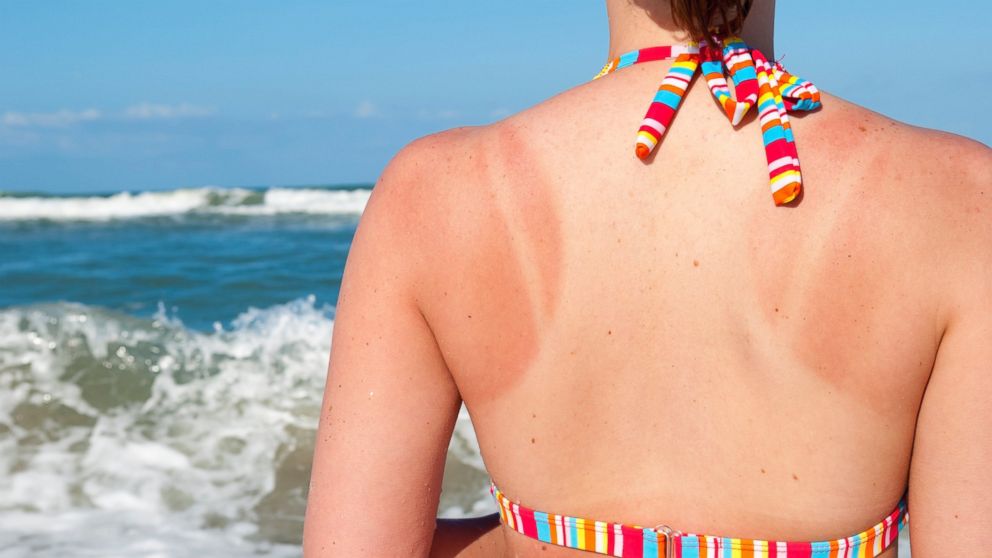5 Long Weekend Health Hazards and How to Dodge Them
Protect yourself from food poisoning and rip currents this holiday weekend.

— -- intro: For many Americans, the Fourth of July weekend means lighting up the barbecue, taking a dip in the ocean or simply basking in the sunshine. But the festivities can also bring bug bites, sunburns and underdone burgers.
Here, a list of five long weekend mishaps and how to avoid them.
quicklist: 1category: Long Weekend Health Hazardstitle: Sunburnsurl:text: Whether you’re relaxing at the beach or picnicking in the park, experts warn that even a single sunburn can do lasting damage to the skin.
To enjoy the sun safely, the American Academy of Dermatology recommends using water-resistant, broad-spectrum sunscreen, which protects against UVA and UVB rays, which has an SPF of 30 or higher.
Experts also advise seeking shade from 10 a.m. to 2p.m., when the sun's rays are the strongest.
Water can amplify the sun's rays, so be extra-careful at the beach or the pool. And be sure to reapply sun block every two hours or after taking a dip.
If you do get a sunburn, the American Academy of Dermatology recommends taking a cool bath, popping a few aspirin or ibuprofen to help lessen the swelling and redness, and drinking lots of water since a sunburn draws fluid from the body.
quicklist: 2category: Long Weekend Health Hazardstitle: Insects That Sting and Biteurl:text: Venturing out into the great outdoors can be not-so-great when it comes to stinging and biting insects.
While many of these insects are merely a nuisance, for people who are allergic, they can be deadly.
The American College of Allergies, Asthma and Immunology estimates that 2 million Americans are allergic to insect stings. More than 500,000 Americans end up in the hospital every year due to insect stings and bites, and they cause at least 50 known deaths a year.
Richard Pollack, a public health entomologist and instructor at the Harvard School of Public Health, said it's imperative for those who are allergic to insect stings to carry around an epinephrine autoinjector, which can deliver life-saving medication to ease a severe allergic reaction.
"It does you no good to have it in your medicine cabinet if you're out and about [and get stung]," said Pollack.
In addition to life-threatening reactions from bee or wasp stings, warmer weather also means ticks will be looking for a host to feed off. The insects can carry diseases, including Lyme disease or Rocky Mountain spotted fever.
"If you're going to enjoy the outdoors, even just a backyard barbecue, you run some risk of acquiring a tick," said Pollack. "At the end of the day, do a tick check on yourself, children and even your pets."
To keep insects at bay during the spring and summer months, Pollack recommends using an insect repellent when outdoors and putting screens over your windows to keep out pests such as mosquitoes.
quicklist: 3category: Long Weekend Health Hazardstitle: Food Poisoningurl:text: Whether you’re packing a picnic or getting ready to grill, make sure you take steps to avoid food poisoning.
About 48 million Americans become sick with food poisoning every year, according to the U.S. Centers for Disease Control and Prevention. Reactions to spoiled food include nausea, vomiting, fever or diarrhea.
The CDC recommends that foods prone to spoiling like deviled eggs and potato salad not be left unrefrigerated for more than two hours – one hour in extremely hot weather – and that meat is cooked to the proper temperature.
The United States Department of Agriculture even has a website dedicated to grilling safely, which explains the correct temperature for all your favorite summer meals.
Hot dogs, for example, need to be cooked to 165 degrees Fahrenheit or until steaming hot.
quicklist: 4category: Long Weekend Health Hazardstitle: Poison Ivyurl:text: A hiking trip can be a great way to enjoy the long weekend, but one brush with poison ivy and a fun holiday excursion can turn excruciating.
While many people know to avoid "leaves of three," the American Academy of Family Physicians says if people accidently swipe the plant they can quickly wash the skin with soap and water to help minimize effects. The oily sap of the plant contains urushiol, which bonds to the skin after a few minutes of contact and over the next few days will result in an itchy-blistered rash.
If you end up one of the unfortunate ones who didn't spot the plant in time, you can use one of the recommended over-the-counter medications such as a hydrocortisone cream, Calamine lotion, an antihistamine or an oatmeal bath to ease the symptoms.
quicklist: 5category: Long Weekend Health Hazardstitle: Rip Currentsurl:text: Rip currents are narrow channels of water moving away from the shore that can reach speeds as fast as 8 feet per second, according to the National Oceanic and Atmospheric Association. That’s faster than an Olympic swimmer can sprint.
The quick-moving currents cause more than 100 drownings each year in the United States, according to the NOAA, and account for more than 80 percent of all beach water rescues. The can occur on any beach with breaking waves, including beaches along the Great Lakes.
The NOAA offers the following tips:
- Never swim alone
- Swim at a lifeguard-protected beach if possible and obey all lifeguard orders
- “If in doubt, don’t go out!”
- If you get caught in a rip current, stay calm and swim out of it parallel to the shoreline, then swim back to shore
- If you’re unable to swim out of the rip current, float or tread water, then swim back to shore or try to get someone’s attention if you need help
- If you see someone in trouble, get help from a lifeguard or call 911. “Remember, many people drown while trying to save someone else from a rip current,” the NOAA website reads
A version of this story previously ran on ABCNews.com.